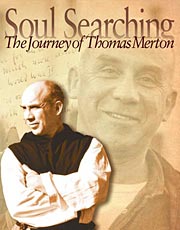Filmmaker Morgan Atkinson spent two years studying and assimilating all the information he could on the life and work of the great Trappist monk Thomas Merton. He interviewed 30 of his friends and scholars and made an hour-long DVD, packaged with the book, about this contemplative pioneer, literary critic and poet, social justice advocate, and contemporary father of the Catholic church. Atkinson and fellow editor Jonathan Montaldo, who has served as director of the Thomas Merton Center at Bellarmine University, rely heavily on Merton's journals and his experiences from ages 20 - 23. The interviews revolve around four geographical centers of his life: New York City; the Abbey of Gethsemani in rural Kentucky: Louisville, Kentucky: and points East and West (to accommodate his travels in the last year of his life).
Among the many topics covered are Merton's early years in New York City, his conversion, becoming a monk, his obedience to his superiors, teaching, his love of the natural world, solitude, the 4th and Walnut revelation, his voluminous correspondence, his passion for social justice and peace, interreligious dialogue, his brief emotional affair, and his trip to Asia. There are many insightful comments on Merton's life and ministry by Daniel Berrigan, John Dear, Christine Bochen, Paul Elie, Coleman McCarthy, Michael Mott, Anthony Padovano, Rosemary Radford Ruether, William Shannon, and others. Speaking of his legacy, Lawrence Cunningham says: "I think that Thomas Merton could easily be called the greatest spiritual writer and spiritual master of the twentieth century in English speaking America. There is no other person who has such a profound influence on those writing on spiritual topics."
